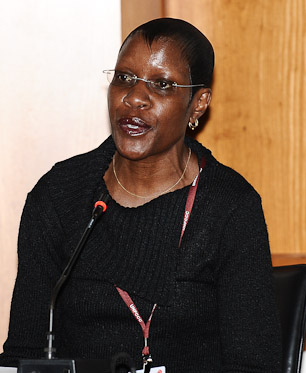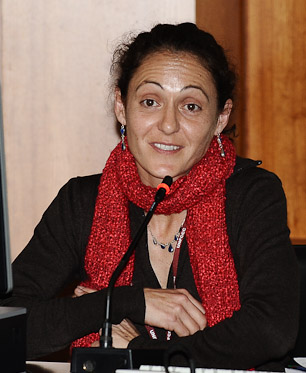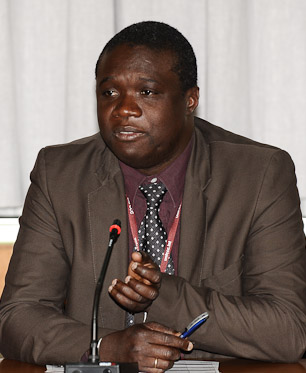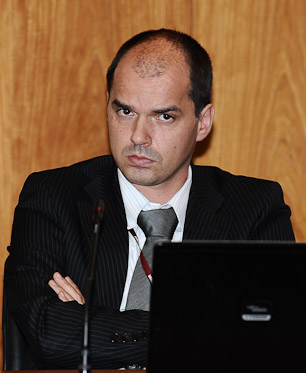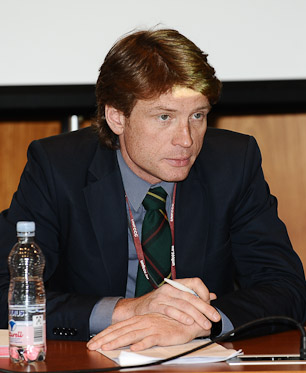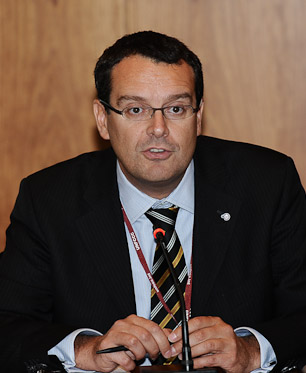 |
A Special Report on Selected Side Events at the 1-12 June 2009 Bonn, Germany |
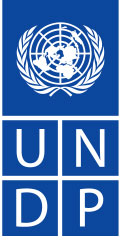 |
| Daily Web Coverage and Reports | ||||||||||||||||||||||||
| 1 June | 2 June | 3 June | 4 June | 5 June | 6 June | 8 June | 9 June | 10 June | 11 June | 12 June | ||||||||||||||
| HTML | ||||||||||||||||||||||||
Events on Friday, 12 June 2009
Advancing Capacity to Support Climate Change Adaptation (ACCCA): Lessons Learned from 14 Pilot Actions
Presented by Environmental Development Action in the Third World (ENDA-TM)
This event presented results from a project entitled “Advancing Capacity for Climate Change Adaptation: Description of 14 Pilot Actions in Africa and Asia.”
Mamadou Diakhite, UN Institute for Training and Research (UNITAR), introduced the ACCCA project, underscoring its goal of combining research and on-the-ground implementation. Sudhir Sharma, UNFCCC Secretariat, noted that the ACCCA project helps to build local capacity and stressed the need to share project results with other communities. Michel Van Den Bossche, EC, discussed various ongoing adaptation-related projects in the EC’s EuropeAid Co-operation Office.
Fernanda Zermoglio, ACCCA Support Team, provided an overview of the ACCCA projects, highlighting that they involved communities and scientists working together to address climate change risks and adaptation needs.
Maggie Opondo, University of Nairobi, Kenya, described two projects that were undertaken in her country that aimed to reduce vulnerability to malaria epidemics. She said the projects employed a participatory approach to foster community ownership.
Togtokh Chuluun, National University of Mongolia, discussed a project undertaken in his country, which aimed to develop local adaptation strategies for coupled human-environment systems in rangelands. He explained that the project, inter alia, defined best land management practices for fragile rangelands and in pastoral systems, and restored cultural landscapes at multiple scales.
Florencia Pulhin, University of the Philippines, Los Baños, described a project in the Philippines that evaluated the vulnerability of upland farmers to climate change and aimed to build capacity through workshops, training sessions and the production of communication materials. She said the project conducted an impact assessment and an assessment of the level of awareness among farmers and stakeholders of climate change issues.
Suppakorn Chinvanno, SysTem for Analysis, Research, and Training (START), suggested possible next steps, including: expanding the scope of adaption actions; scaling up pilot actions by mainstreaming them into national development strategies and policies; and including a monitoring mechanism in communities to help understand how to sustain benefits in the long term.
Participants discussed, inter alia, lessons learned from the project.
|
|
The EU Climate and Energy Package
Presented by Portugal
This event presented the new EU climate and energy policy.
Jürgen Lefevere, European Commission (EC), stressed that the new EU climate and energy package is legally binding on EU Member States and will enter into force on 25 June 2009. He said it is comprehensive and includes, inter alia, decisions on renewable energy, effort sharing and the EU Emissions Trading Scheme (ETS). Lefevere drew attention to the Renewable Energy Directive, which stipulates that energy from renewable sources should be increased from 8.5% to 20% by 2020.
Simon Marr, EC, discussed the new phase of the EU ETS, which will take place between 2013-2020. He said its primary feature is a “robust” EU-wide cap beyond 2020 that sets out to achieve absolute emission reductions of 6.5% compared to 2005 levels. He stressed that: the ETS has fully harmonized allocation rules; auctioning is the default allocation method; and free allocation is to be phased out in favor of full auctioning by 2027.
Marr emphasized that as of 2013 more than 50% of the total cap is to be auctioned, with expected revenues of €30-50 billion annually, and added that at least 50% of auctioning revenues will be used to fund mitigation and adaptation policies within and outside of the EU. He said the EU envisions: an OECD-wide carbon market by 2015, to be extended to advanced economies by 2020; linkages between the EU ETS and non-Annex B countries such as the US as well as sub-state entities; and pilot projects to test the inclusion of REDD credits in carbon markets.
Tom van Ierland, EC, presented the new EU decision on effort sharing, noting it covers 60% of the EU’s GHG emissions and involves all economic sectors except Land Use, Land-Use Change and Forestry and those covered by the EU ETS. He stressed that it includes: binding annual targets for 2013-2020; strict reporting obligations and annual compliance checks; and immediate corrective action against Member States in case of non-compliance. He said national reduction targets were determined on the basis of GDP per capita, and will average 10% for non-ETS sectors by 2020, compared to 2005 levels. Van Ierland described flexibility mechanisms, including the ability to: bank early over-achievements; borrow up to 5% emissions from the subsequent year; transfer emission rights between Member States; and use CDM credits of up to 3% of 2005 emissions.
|
| Daily Web Coverage and Reports | ||||||||||||||||||||||||
| 1 June | 2 June | 3 June | 4 June | 5 June | 6 June | 8 June | 9 June | 10 June | 11 June | 12 June | ||||||||||||||
| HTML | ||||||||||||||||||||||||
Digimarc and the Digimarc logo are registered trademarks of Digimarc Corporation. The "Digimarc Digital Watermarking" Web Button is a trademark of Digimarc Corporation, used with permission.
Please e-mail the Digital Editor should you have any questions regarding the content of this page.
| Back to IISD RS "Linkages" home | Visit IISDnet | Send e-mail to ENB |
© 2009, IISD. All rights reserved.

